Kidney transplants are one of the most sought-after medical procedures in India, offering a life-saving solution for somebody suffering from end-stage renal disease (ESRD) or chronic kidney failure. With advancements in medical technology & the availability of qualified healthcare professionals, India has emerged as a global hub for affordable and high-quality kidney transplants. For patients & their families, understanding the kidney transplant cost in India is a crucial step in planning the treatment. From the surgery to pre-and post-operative care, expenses can differ significantly depending on multiple factors, such as the hospital’s location, the surgeon’s expertise, and the required post-transplant medications.
This guide delves deep into the costs of kidney transplants in India, providing a city-wise comparison, key factors influencing the expenses, and tips for managing financial challenges. Whether you’re a patient seeking treatment or exploring options for loved ones, this blog will provide comprehensive information.
For more details on surgery costs in India, check out our detailed guide here: Comprehensive Guide to Treatment and Surgery Costs in India.
Read More: Impactguru hospital finder

Table of Contents
- What Is The Cost Of a Kidney Transplant In India?
- Kidney Transplant Costs In Different Indian Cities
- Factors Affecting Kidney Transplant Costs in India
- Types Of Kidney Transplants
- List Of 10 Best Hospitals For Kidney Transplant In India
- 1. Medanta – The Medicity, Gurgaon, Haryana:
- 2. Apollo Hospitals, Chennai, Tamil Nadu:
- 3. Fortis Hospitals, Mumbai, Maharashtra:
- 4. Indraprastha Apollo Hospitals, New Delhi:
- 5. Yashoda Hospitals, Hyderabad, Telangana:
- 6. Gleneagles Global Hospitals, Hyderabad, Telangana:
- 7. Artemis Hospital, Gurgaon, Haryana:
- 8. Wockhardt Hospitals, Mumbai, Maharashtra:
- 9. Max Super Speciality Hospital, Delhi:
- 10. Manipal Hospitals, Bengaluru, Karnataka:
- Conclusion
- FAQs
What Is The Cost Of a Kidney Transplant In India?
India offers highly competitive kidney transplant costs compared to other countries, making it a favored choice for medical tourists. On average, the price ranges between ₹5,00,000 and ₹15,00,000, depending on various factors. This includes pre-transplant evaluations, surgical procedures, hospitalization, and post-transplant care.
Breakdown Of Key Cost Components:
- Pre-Transplant Evaluations:
- Tests like blood work, tissue typing, and cross-matching.
- Cost: Approximately ₹50,000 to ₹1,00,000.
- Surgery Charges:
- Includes the cost of the transplant procedure, surgeon’s fees, and operating room charges.
- Cost: Around ₹4,00,000 to ₹8,00,000.
- Post-Transplant Medications:
- Anti-rejection drugs and immunosuppressants are essential for preventing organ rejection.
- Monthly cost: ₹20,000 to ₹30,000 (for lifelong use).
- Hospital Stay:
- Duration: 7 to 14 days (or more in case of complications).
- Cost: ₹1,00,000 to ₹2,00,000.
Patients must consult multiple hospitals for a detailed cost estimate tailored to their medical requirements. Additionally, leveraging financial assistance or insurance coverage can help manage the overall expenses.
Also Read: Kidney Transplant Cost In Bangalore & Best Hospitals For It
Kidney Transplant Costs In Different Indian Cities
The cost of kidney transplants can vary significantly across different cities in India. Here is a breakdown of the average costs in some major cities:
| City | Average Cost (INR) |
| Delhi | 6,00,000 – 12,00,000 |
| Mumbai | 7,00,000 – 15,00,000 |
| Chennai | 5,50,000 – 14,00,000 |
| Bangalore | 6,50,000 – 13,00,000 |
| Hyderabad | 6,00,000 – 12,50,000 |
| Kolkata | 5,00,000 – 11,00,000 |
| Pune | 5,50,000 – 12,00,000 |
| Ahmedabad | 5,00,000 – 10,50,000 |
| Jaipur | 5,50,000 – 11,50,000 |
| Lucknow | 5,00,000 – 10,00,000 |
Factors Affecting Kidney Transplant Costs in India
The price of a kidney transplant can differ widely depending on several critical factors. Understanding these factors can help patients & their families make informed decisions and better plan the procedure.
1. Hospital Location
- The cost of kidney transplants tends to be higher in metropolitan cities like Mumbai, Delhi, and Bangalore due to advanced facilities and a higher cost of living.
- Smaller or tier-2 cities often offer more reasonable alternatives without compromising the quality of care.
2. Surgeon’s Expertise
- Experienced and renowned surgeons may charge higher fees, which can significantly impact the overall cost.
- Surgeons with international training or specialization in transplant surgeries may have premium charges.
3. Type of Hospital
- Private hospitals typically charge more than government hospitals due to better infrastructure, shorter waiting times, and advanced technologies.
- Multi-specialty hospitals often provide comprehensive care but at a higher cost.
4. Donor Type
- Living Donor: When the donor is a family member or relative, the cost is generally lower as it avoids expenses related to donor organ procurement.
- Deceased Donor: The process of procuring organs from deceased donors involves additional legal, logistical, and medical costs.
5. Pre-Existing Medical Conditions
- Patients with co-morbidities like diabetes, hypertension, or heart disease may require additional tests and treatments, increasing the total cost.
6. Post-Operative Care
- Immunosuppressant medications are essential to prevent organ rejection, and their lifelong use can add a significant amount to overall expenses.
- Frequent follow-ups and monitoring post-surgery also contribute to the costs.
7. Insurance Coverage
- The extent of coverage offered by health insurance policies can drastically affect out-of-pocket expenses.
- Not all policies cover the entire cost of kidney transplants, especially post-operative medications.
8. Complications During Surgery
- If complications arise during or after the transplant, additional interventions such as extended hospital stays or further surgeries may increase costs.
9. Medical Tourism Packages (For International Patients)
- Many international patients seek kidney transplants in India due to their affordability and quality.
- Hospital packages often include visa assistance, accommodation, and travel, impacting the overall cost.
By considering these factors, patients can better evaluate their options and plan financially for a kidney transplant. To explore more on managing surgery costs, refer to our Comprehensive Guide to Treatment and Surgery Costs in India.
Types Of Kidney Transplants
In India, there are primarily two types of kidney transplants based on the donor source:
1. Living-Donor Kidney Transplant: In this type, a healthy kidney is donated by a living person, often a close relative such as a parent, sibling, or child. Living donor transplants generally offer better success rates due to the rapid availability of healthy organs and reduced waiting times. However, it’s essential that the donor undergoes thorough medical evaluations to ensure compatibility and overall health.
2. Deceased-Donor Kidney Transplant: Also known as cadaveric transplants, these involve kidneys donated by individuals who have recently passed away. Recipients are put on a waiting list, and allocation is based on factors like compatibility, urgency, and waiting time. While the availability of deceased donor kidneys can be limited, advancements in medical practices have improved their success rates over time.
List Of 10 Best Hospitals For Kidney Transplant In India
1. Medanta – The Medicity, Gurgaon, Haryana:
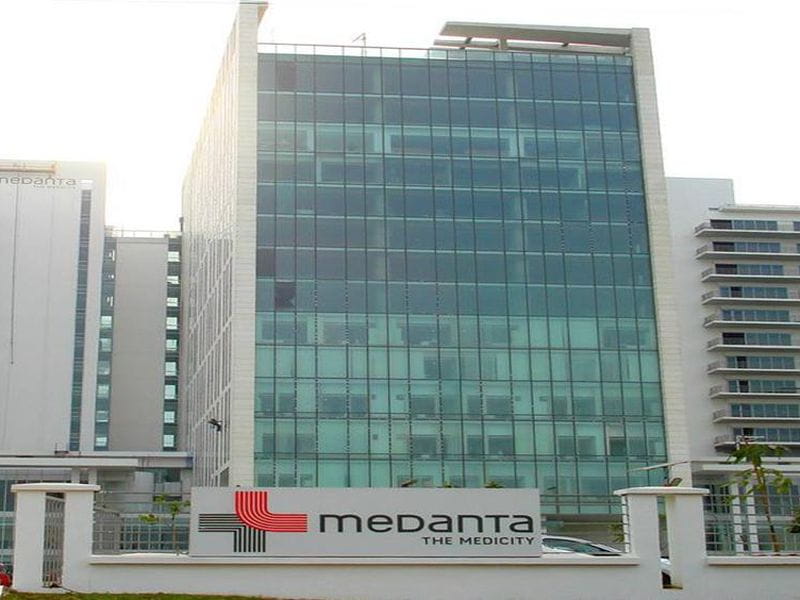
Established in 2009 by the esteemed cardiovascular and cardiothoracic surgeon Dr. Naresh Trehan, Medanta was founded to provide advanced yet affordable medical care. Over the years, it has become a symbol of excellence in the healthcare sector.
Medanta has achieved remarkable milestones in kidney transplants, earning its reputation as one of the best hospitals for this procedure in India. Here are some of its notable achievements:
- High-Volume Transplant Center: Medanta performs over 250 kidney transplants annually, making it one of the highest-volume centers in the country.
- Robotic Renal Transplant: The hospital is renowned for performing the world’s first robotic renal transplant under regional hypothermia, a groundbreaking procedure pioneered by Dr. Rajesh Alhawat.
- State-of-the-Art Infrastructure: Medanta utilizes cutting-edge technology, including the latest surgical robots (Da Vinci Xi/Si) and modern operating rooms, ensuring outcomes that meet global standards.
- Comprehensive Care: The hospital offers a multi-disciplinary approach to kidney transplantation, providing comprehensive care from initial evaluation to post-operative management.
- Cadaveric Transplants: Medanta is proficient in cadaveric transplants, employing advanced techniques to optimize outcomes.
- ABO-Incompatible Transplants: The hospital successfully performs ABO-incompatible kidney transplants, allowing for a broader range of donor-recipient matches.
2. Apollo Hospitals, Chennai, Tamil Nadu:
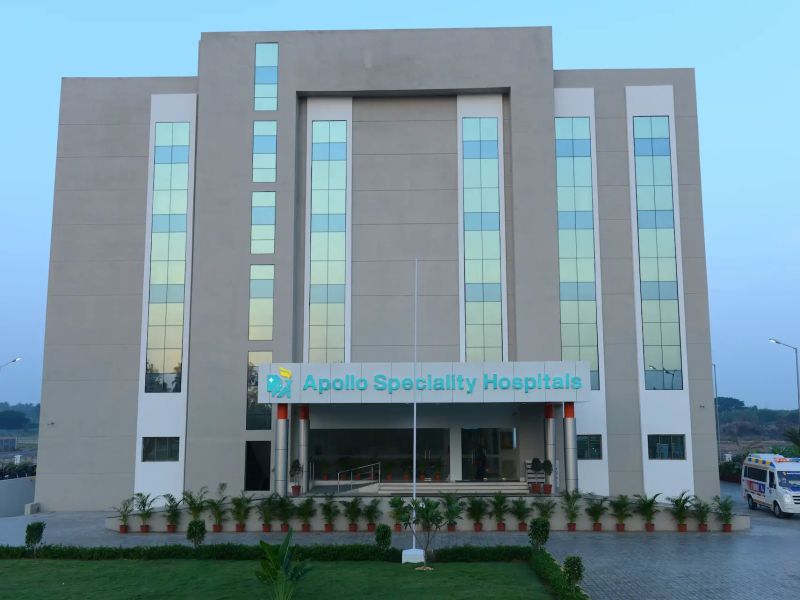
Started in 1983 by Dr. Prathap C. Reddy, Apollo Hospitals was established to bring world-class healthcare to India. Since its inception, the hospital has been at the forefront of medical innovation, particularly in organ transplantation.
Achievements in Kidney Transplantation:
- First Successful Kidney Transplant (1984): Apollo Hospitals, Chennai, performed its first successful kidney transplant in June 1984, marking a significant milestone in India’s medical history.
- High Volume of Kidney Transplants: The Apollo Hospitals Group has conducted over 10,000 kidney transplants, with nearly 400 kidney transplants performed annually, underscoring its position as one of the largest and most experienced transplant centers globally.
- Simultaneous Kidney-Pancreas Transplant: Apollo Hospitals, Chennai, achieved Asia’s first concurrent kidney-pancreas transplant on a 38-year-old patient, demonstrating its capability to handle complex transplant procedures.
- Transplants for International Patients: The hospital has successfully performed kidney transplants on international patients, including two individuals from Mauritius with end-stage kidney disease, highlighting its global reputation and trust.
- Comprehensive Transplant Program: Apollo Hospitals has a robust transplant program. It performed 537 liver, kidney, and heart transplants in 238 days, making it the second-busiest transplant program worldwide.
- Dedicated Transplant Centers: Apollo Hospitals has established 12 centers for kidney transplants across India, ensuring accessibility and comprehensive care for patients nationwide.
3. Fortis Hospitals, Mumbai, Maharashtra:
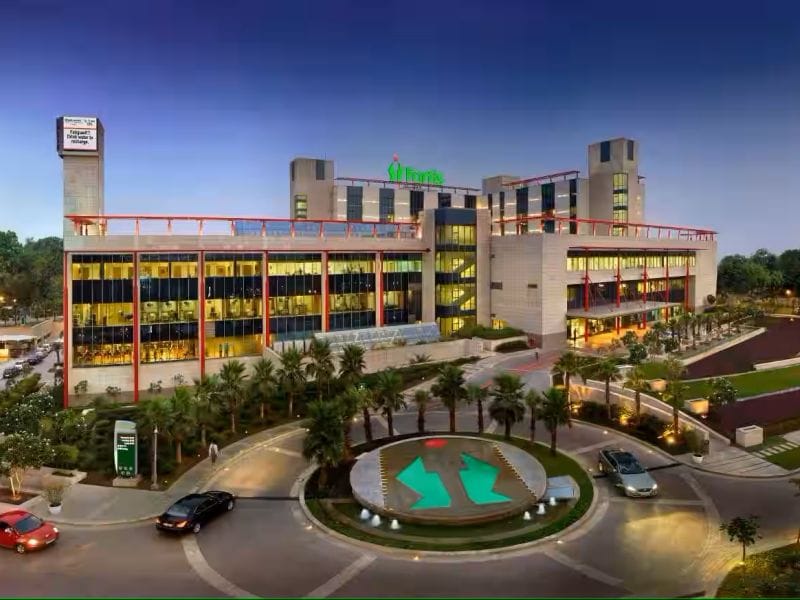
Fortis Hospitals, Mumbai, Maharashtra, is esteemed as one of the top institutions for kidney transplants in India. Established in 2002, Fortis Healthcare has rapidly grown into a leading healthcare provider renowned for its cutting-edge facilities and exceptional medical care. Over the years, the hospital has made significant advancements in kidney transplantation, solidifying its reputation for excellence and innovation.
Fortis Hospitals, Mumbai, has achieved numerous milestones in kidney transplantation, including:
1) Comprehensive Kidney Transplant Services:
Fortis Hospitals in Mumbai offer a wide array of kidney transplant options, including living-donor kidney transplants and advanced treatments for complex cases such as ABO-incompatible, positive crossmatch, and paired donation kidney transplants. Their multidisciplinary team provides personalized care, ensuring optimal outcomes for each patient.
2) Robotic-Assisted Kidney Transplants:
Fortis Hospital, Bannerghatta Road, has been a pioneer in robotic-assisted kidney transplant surgeries. One key achievement includes performing a successful robot-assisted laparoscopic transplant kidney pelvic-cystostomy, which demonstrated the hospital’s leadership in adopting cutting-edge technology to enhance surgical precision and minimize recovery time.
3) Rising Transplant Volumes:
Fortis Hospitals has substantially increased the number of cadaveric kidney transplants in Mumbai, with the number of procedures rising from 36 in 2013 to 71 in 2014. This growth highlights the hospital’s active efforts in addressing the rising demand for kidney transplants in the region.
4) Recognition and Awards:
Fortis Hospitals have earned significant recognition for their kidney transplant programs. For instance, in December 2024, Fortis Hospital Gurugram was awarded the 3rd Edition of the Medsurge India Awards, underscoring its excellence in organ transplants.
4. Indraprastha Apollo Hospitals, New Delhi:
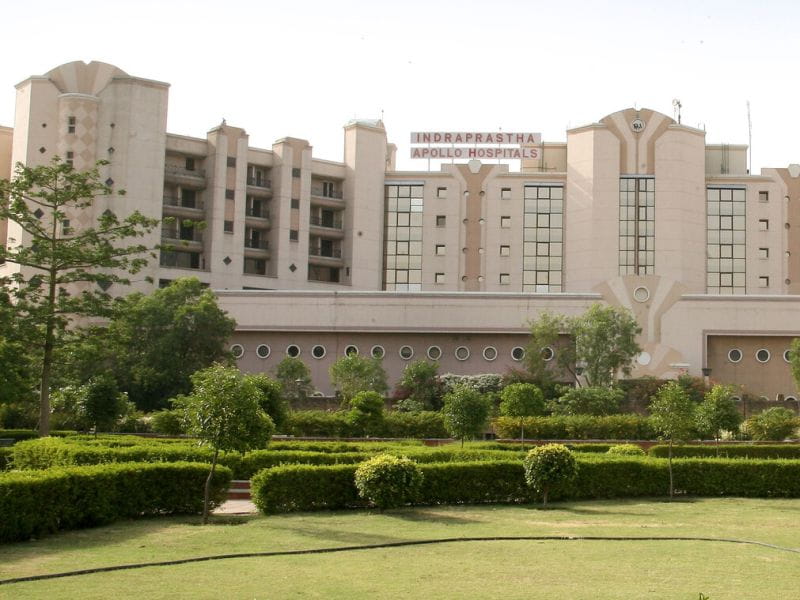
Established in 1996 by Dr. Prathap C. Reddy, the hospital has become a leading healthcare provider known for its state-of-the-art facilities & excellent medical care. Over the years, Indraprastha Apollo Hospitals has made significant advancements in kidney transplantation, establishing itself as a center of excellence.
Indraprastha Apollo Hospitals has achieved numerous milestones in kidney transplantation, including:
- High Volume Transplant Center: The hospital has performed over 100 kidney transplants, making it one of the leading centers in the region.
- First Cadaveric Kidney Transplant: The hospital performed the first successful cadaveric kidney transplant in New Delhi, setting a benchmark for organ transplantation in the region.
- Pioneering Techniques: Indraprastha Apollo Hospitals has introduced advanced techniques in kidney transplantation, including minimally invasive and robotic-assisted surgeries.
- Comprehensive Care: The hospital offers a multi-disciplinary approach to kidney transplantation, providing comprehensive care from pre-transplant evaluations to post-operative management.
5. Yashoda Hospitals, Hyderabad, Telangana:
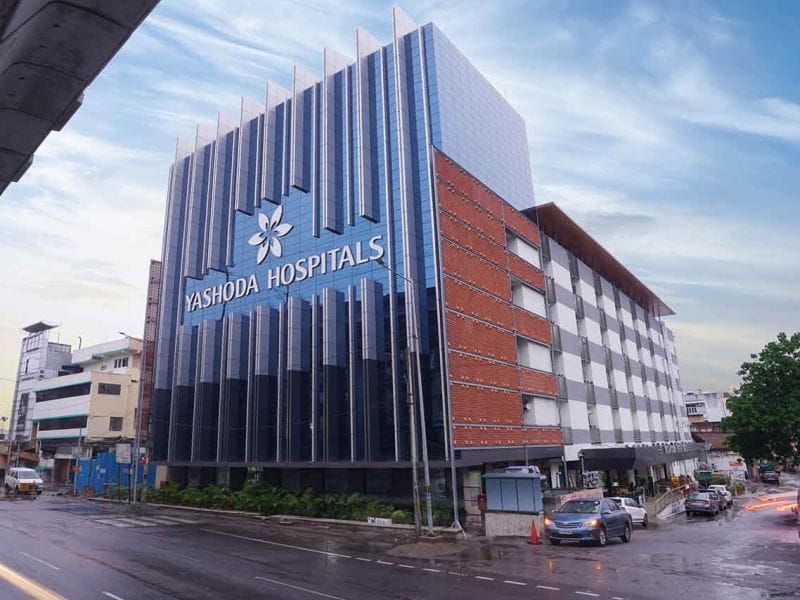
Yashoda Hospitals was founded in 1991 by Dr. Ramesh Kumar to provide high-quality healthcare services to the people of Hyderabad and surrounding regions. Over the years, the hospital has expanded its services and facilities, becoming a center of excellence for various medical specialties, including kidney transplantation.
Achievements in Kidney Transplantation:
- High Success Rate:
Yashoda Institute of Kidney Transplantation has successfully conducted over 1,000 kidney transplants, achieving a success rate of 90%. This accomplishment underscores the hospital’s commitment to providing effective and reliable kidney transplant services. - Comprehensive Kidney Transplant Services:
The hospital offers a range of kidney transplant options, including living donor and deceased donor (cadaveric) transplants. Its multidisciplinary team ensures personalized care, addressing each patient’s unique needs. - Multi-Organ Transplant Expertise:
Yashoda Hospitals have experience in performing multi-organ transplant procedures, including kidney, liver, heart, lung, and bone marrow transplants. Their Centers of Excellence adopt a comprehensive evaluation and multidisciplinary approach to ensure exceptional outcomes. - Recognition for Organ Donation Efforts:
In August 2024, during the 14th Indian Organ Donation Day, Yashoda Hospitals Secunderabad received the award for the highest Deceased Donation from the National Organ and Tissue Transplant Organization (NOTTO). This recognition highlights the hospital’s dedication to promoting organ donation and transplantation.
6. Gleneagles Global Hospitals, Hyderabad, Telangana:
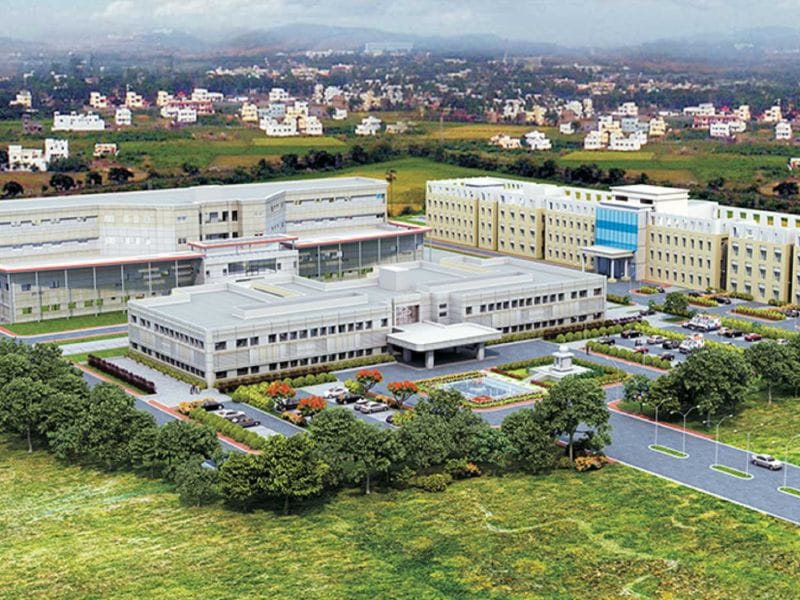
Gleneagles Global Hospitals in Hyderabad, Telangana, was established in 1999 by Dr. K. Ravindranath, focusing on multi-organ transplantation.
The hospital has achieved significant milestones in kidney transplantation:
- Completion of 500 Kidney Transplants: BGS Gleneagles Global Hospital completed 500 kidney transplants within nine years, marking a significant achievement in renal care.
- Completion of 504 Kidney Transplants: Gleneagles Global Health City announced the successful completion of 504 kidney transplants, reflecting its commitment to advanced nephrology and renal transplantation services.
- First Twin Kidney Transplant in the Region: The hospital performed the first twin kidney transplant in the erstwhile state of Andhra Pradesh and Telangana, showcasing its pioneering efforts in complex transplant procedures.
7. Artemis Hospital, Gurgaon, Haryana:
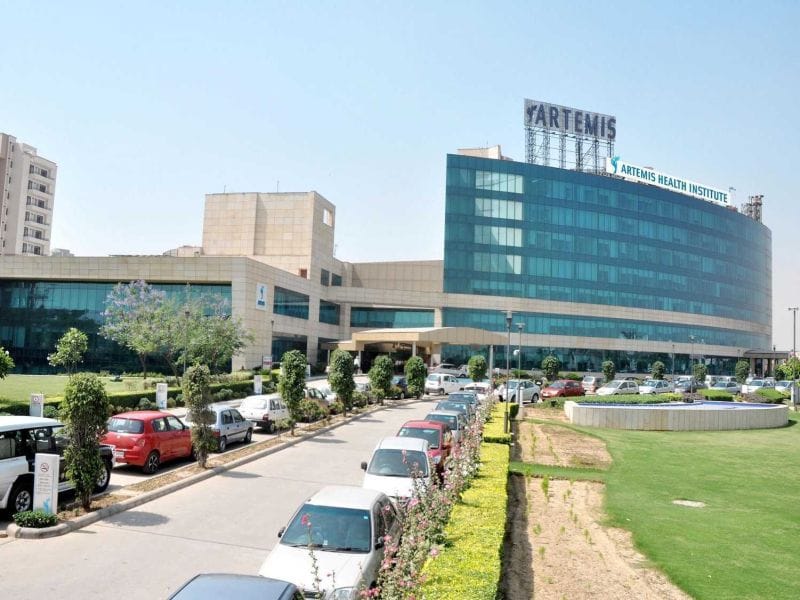
Artemis Hospital in Gurgaon, Haryana, established in 2007 by the promoters of the Apollo Tyres Group, has garnered recognition for its exceptional kidney transplant program.
Achievements in Kidney Transplantation:
- Comprehensive Transplant Services: Artemis Hospital offers a wide range of transplant services, including kidney, liver, cornea, and bone marrow transplants, positioning it as a leading center for multi-organ transplantation.
- Advanced Surgical Techniques: The hospital has successfully performed robotic kidney transplants, demonstrating its commitment to adopting cutting-edge technology to enhance patient outcomes.
- Experienced Transplant Team: Artemis’s Urology & Kidney Transplant Team comprises highly skilled professionals dedicated to providing complete care to patients undergoing kidney transplantation.
- Patient-Centric Approach: Artemis Hospital emphasizes personalized care, ensuring patients receive tailored treatment plans and support throughout their transplant journey.
- Recognition and Awards: The hospital has received several accolades for its excellence in healthcare, including the ‘Excellence in Healthcare Award’ at India’s Most Trusted Healthcare Awards 2019, recognizing it as the Best Bone Marrow Transplant Centre in North India.
8. Wockhardt Hospitals, Mumbai, Maharashtra:
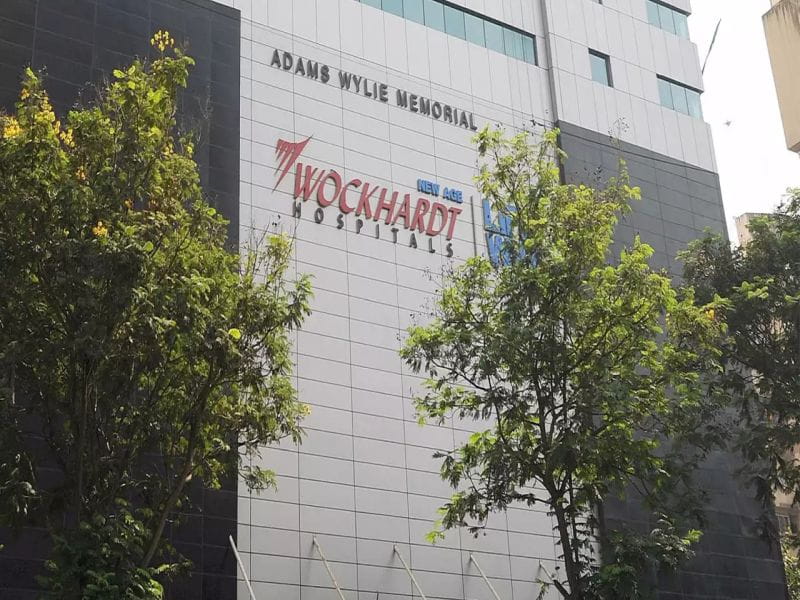
Wockhardt Hospitals, a prominent healthcare provider in Mumbai, Maharashtra, has established itself as a leading center for kidney transplantation. The hospital’s commitment to excellence is apparent through its state-of-the-art facilities & a group of highly skilled nephrologists and transplant surgeons.
Achievements in Kidney Transplantation:
- Successful Transplant for International Patients: In April 2024, Wockhardt Hospitals successfully performed a kidney transplant on a 26-year-old patient from Niger suffering from chronic renal failure. This case highlights the hospital’s ability to handle complex international cases, even during challenging times.
- Pioneering Cadaver Kidney Transplant in Nagpur: Wockhardt Hospitals achieved a notable milestone by performing the first successful cadaver kidney transplant in the Nagpur region. The kidneys of an 18-year-old brain-dead accident victim were transplanted into two young patients with chronic kidney disease, emphasizing the hospital’s role in promoting cadaver organ donations.
- Recognition for Innovation in Service Delivery: The hospital has been acknowledged for its innovative approaches, winning the recognition of Innovation in Quality of Service Delivery at the group level. This recognition underscores Wockhardt Hospitals’ dedication to enhancing patient care and service quality.
- Comprehensive Kidney Transplant Services: Wockhardt Hospitals offers a full spectrum of kidney transplant services, including preoperative evaluation, dialysis support, and comprehensive postoperative care. Their multidisciplinary team ensures personalized treatment plans tailored to each patient’s needs.
9. Max Super Speciality Hospital, Delhi:
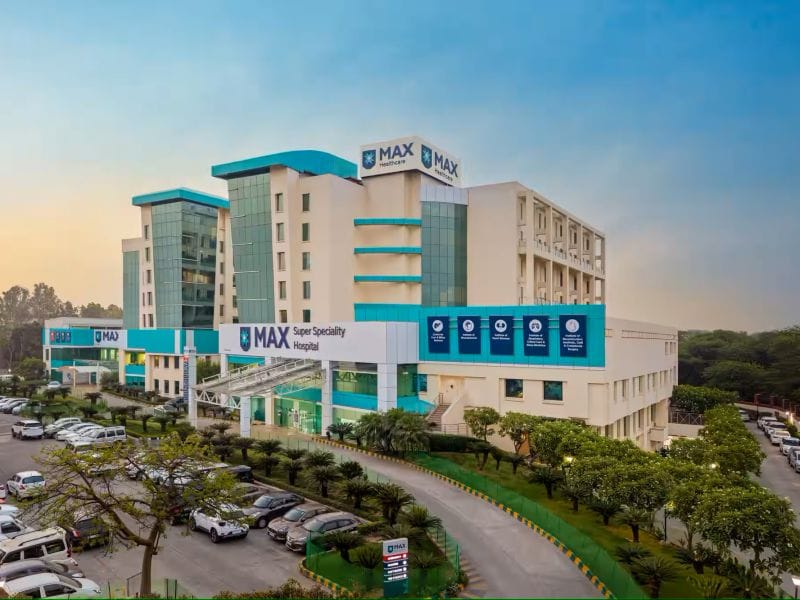
Max Super Speciality Hospital, a leading healthcare institution in Delhi, has established itself as a premier center for kidney transplants in India. The hospital’s dedication to excellence is reflected in its state-of-the-art facilities & a unit of highly skilled nephrologists and transplant surgeons.
Achievements in Kidney Transplantation:
- Comprehensive Kidney Transplant Services: Max Super Speciality Hospital offers a full spectrum of kidney transplant services, including living & deceased donor transplants, ABO-incompatible transplants, and specialized pediatric kidney transplantation. Their multidisciplinary team ensures personalized treatment plans tailored to each patient’s needs.
- Cutting-edge Technology: The hospital boasts leading-edge technology and state-of-the-art infrastructure tailored for kidney transplantation. Max Super Specialty Hospital ensures patients receive the best possible care, from modern operating rooms to advanced imaging facilities and a dedicated ICU.
- Successful Complex Transplants: The hospital has successfully performed complex procedures, such as combined liver and kidney transplants, on critically ill patients, demonstrating its expertise in handling intricate cases.
- Patient Success Stories: Max Super Speciality Hospital has numerous patient testimonials highlighting successful kidney transplants, reflecting the hospital’s dedication to patient care and positive outcomes.
10. Manipal Hospitals, Bengaluru, Karnataka:
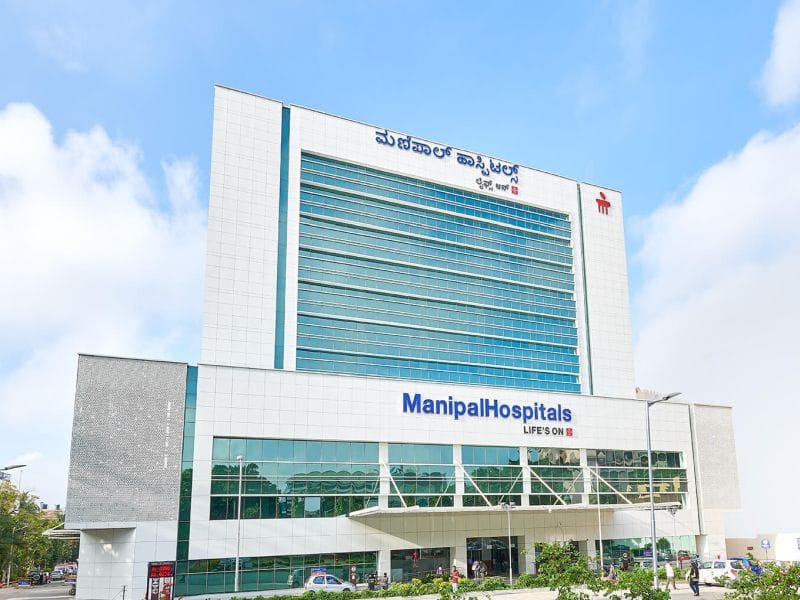
Manipal Hospitals in Bengaluru, Karnataka, has been at the forefront of kidney transplantation in India, earning a reputation for innovation and excellence. Founded as part of the Manipal Education and Medical Group, the institution is recognized for its advanced medical practices & devotion to patient care.
Achievements in Kidney Transplantation:
- Pioneering Cadaver Transplantation in Karnataka:
Dr. H. Sudarshan Ballal, a leading nephrologist at Manipal Hospitals, performed Karnataka’s first cadaver kidney transplant, marking a historic achievement in the state’s healthcare sector. - Robotic-Assisted Kidney Transplant:
Manipal Hospital Whitefield achieved a milestone by conducting its first robotic-assisted kidney transplant on a 32-year-old female patient. This procedure exemplified the hospital’s embrace of cutting-edge technology to enhance surgical precision. - Successful Multi-Organ Transplants:
The hospital has gained recognition for successfully handling complex cases, including multi-organ transplants such as kidney-liver procedures, which require highly skilled multidisciplinary teams. - Growing Transplant Program:
Since launching its transplant program in 2019, Manipal Hospital Whitefield has performed over 50 kidney transplants, reflecting its commitment to providing accessible, high-quality organ transplant services. - Comprehensive Care:
Manipal Hospitals ensures holistic care, offering preoperative counseling, dialysis support, and rigorous postoperative monitoring. This patient-centric approach ensures optimal outcomes for kidney transplant recipients.
Turn your compassion into a powerful force for good.
Refer patients to ImpactGuru and help them get financial support quickly.
Sign up now and start contributing with every referral.
Conclusion
A kidney transplant is a life-saving procedure, and India offers high-quality care at relatively affordable prices compared to other countries. However, the cost can differ based on factors like the hospital’s location, type of donor, and post-surgery care. By understanding the costs, available options, and financial assistance programs, patients can make informed decisions and manage the financial aspects of the treatment effectively. If you or your loved one is considering a kidney transplant, explore your options and consult with trusted medical experts to ensure the best possible outcome.
For a deeper understanding of treatment costs and financial aid opportunities, visit our Comprehensive Guide to Treatment & Surgery Costs in India.
FAQs
1. How much does a kidney transplant cost in India?
The expense of a kidney transplant in India typically ranges from ₹5,00,000 to ₹15,00,000. However, the actual price depends on factors such as the hospital’s location, surgeon’s expertise, and post-operative care.
2. Why are kidney transplant costs in India lower than in other countries?
India offers world-class medical facilities at comparatively lower costs due to affordable infrastructure, skilled professionals, and lower operational costs. Additionally, the cost of living in India is lower than in many Western nations, contributing to the affordability of healthcare services.
3. How much does post-transplant medication cost in India?
Post-transplant medications, such as immunosuppressants, can cost between ₹20,000 and ₹30,000 per month. These medications are critical to preventing organ rejection and are required for the rest of the patient’s life.
4. How does the type of donor affect kidney transplant costs?
The cost can vary depending on whether the donor is living or deceased. A living donor, especially a close family member, may reduce costs related to donor organ procurement, while a deceased donor involves additional legal and medical expenses.
5. Which cities in India offer the most affordable kidney transplants?
Cities like Hyderabad, Chennai, and Pune offer affordable kidney transplants compared to metropolitan hubs like Mumbai and Delhi. Patients often find equally high-quality medical care at a lower cost in tier-2 cities.
6. Are government hospitals in India cheaper for kidney transplants?
Yes, government hospitals like AIIMS (All India Institute of Medical Sciences) in Delhi and PGIMER in Chandigarh offer kidney transplants at significantly lower costs than private hospitals. However, these hospitals often have long waiting lists.
7. What is the cost of pre-transplant evaluations in India?
Pre-transplant tests, including blood work, tissue typing, and cross-matching, cost approximately ₹50,000 to ₹1,00,000. These tests are crucial for determining donor-recipient compatibility.
8. What financial assistance is available for kidney transplants in India?
Patients can explore various options, such as crowdfunding platforms (e.g., ImpactGuru), government schemes, and charitable trusts that help reduce the financial burden of kidney transplants.
9. What are the hidden costs of kidney transplants in India?
Hidden costs may include transportation, accommodation for family members, follow-up consultations, and additional diagnostic tests. Patients should discuss all potential expenses with the hospital in advance.
10. How can I reduce the cost of a kidney transplant in India?
Patients can reduce costs by:
- Opting for treatment in tier-2 cities.
- Applying for financial aid or crowdfunding.
- Checking eligibility for government healthcare schemes.
- Choosing hospitals that offer package deals.












